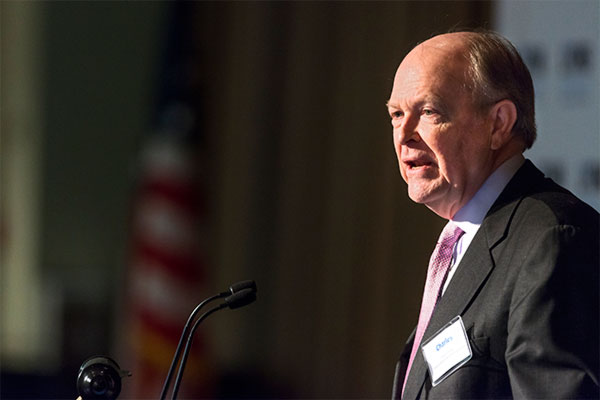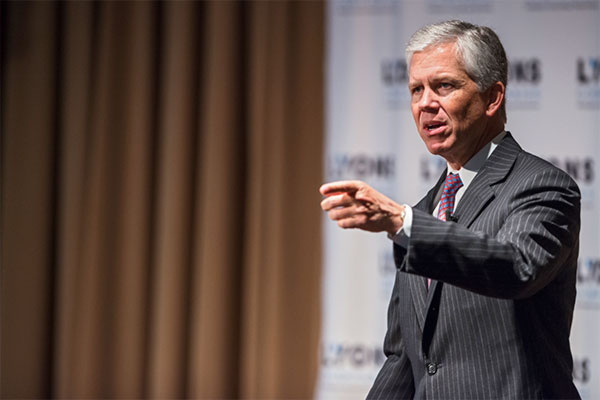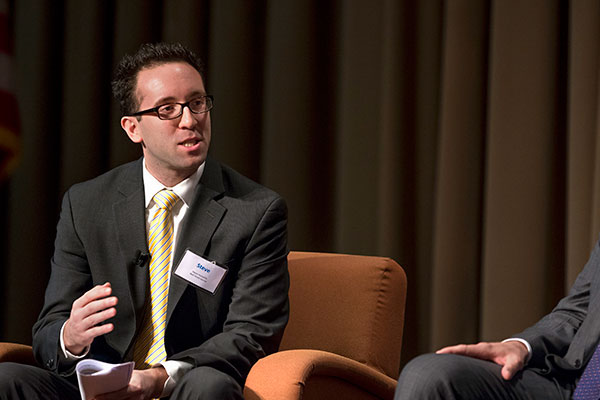


Economic recovery
Economic experts see hope, areas of caution; audience upbeat about future
12:07 p.m., Feb. 18, 2014--Observing the 100th anniversary of the Federal Reserve System, Federal Reserve Bank of Philadelphia President Charles Plosser gave a brief history of this “uniquely American form of a bank” before suggesting economic recovery will continue in 2014 at the annual Economic Forecast sponsored by Lyons Companies and University of Delaware’s Center for Economic Education and Entrepreneurship (CEEE) on Feb. 11.
Plosser, who is a member of the monetary policy setting Federal Open Market Committee, said the economy is “on firmer footing than it has been for a number of years.” He expects growth of about 3 percent this year as well as a shift in the unemployment rate from about 6.7 percent to 6.2 percent.
Campus Stories
From graduates, faculty
Doctoral hooding
While he predicted “a little less fiscal drag in 2014 and that housing will continue to recover,” Plosser also said to take reports on manufacturing activity and job growth “with a grain of salt.”
“Numbers are affected by things like the weather, and winter this year has contributed to an unusual economic pattern,” said Plosser. “I suspect it will be another couple months before we have an underlying read on the economy.”
Plosser said he was less concerned about declines in workforce participation rates, noting they have been in steady decline since 2000, and suggested the driving force behind the lower rate is “retiring baby boomers, pure and simple.”
As for current Fed policy, Plosser said, “the foot is still on the accelerator. My preference would be that we conclude the purchases sooner rather than later.”
Sharing a different perspective was Michael K. Farr, president of Farr, Miller and Washington LLC, a contributor to CNBC and Economic Forecast speaker since 2009.
Farr noted concern over income and spending inequalities, and the concentration of wealth among the top 1 percent of the population.
“Wealthier Americans are driving the spending,” said Farr. “In the absence of income gains, the middle class is spending less. The economy, in my opinion, cannot support higher interest rates.”
Farr also cautioned against investor complacency and unrealistic expectations for earnings growth due to historically high corporate margins, and suggested the process of deleveraging is likely to continue for years. Still, he remained upbeat about the future.
“Bet on America for the long term,” he said. “We have a free capitalistic society where innovation is rewarded. We have a stable democratic government, an educated workforce and positive demographic trends. Inflation and interest rates are very low. Talent, tenacity and hard work can combine to create jobs. Just remember you were given an opportunity, not a handout.”
New this year, a Meridia electronic audience response system framed questions for the experts and engaged participants, producing demographic data in instant responses.
Just over three-quarters of attendees were from Delaware, with 20 percent from neighboring Pennsylvania, Maryland and New Jersey.
Of those polled, 64 percent represented the financial and business professional services industries, and 80 percent were either very confident or confident about prospects for their business this year.
The event concluded with a question and answer session between panelists and the audience, including additional poll questions, moderated by 2007 UD graduate and Wall Street Journal reporter Steven Russolillo.
H. Lawrence Culp Jr., president and chief executive officer of Danaher Corporation, offered a corporate perspective.
“I don’t like to blame the weather,” said Culp, echoing Plosser’s earlier remarks, “but when the spring comes we’ll see slow, stable growth.”
Farr agreed.
“Our reactions and investor reactions to what is going on in the economy now is crucial,” said Farr. “We haven’t had a significant pullback in recent years. Warren Buffet says Americans are very strange; they love stocks when they’re expensive and hate it when they’re cheap. Markets go down, stock prices fluctuate. As we recover and work our way out, it’s going to be bumpy. You don’t expect every day to be sunny. You have to look at the long term.”
As for the audience, 59 percent polled see interest rates rising despite decline thus far in 2014. Just under half of the audience expects the latest debt ceiling negotiation will have just a little impact on the economy and the markets.
“As operators we see a lot of that conversation as noise,” said Culp, who admitted his perspective comes from “inside the beltway. By and large I think the corporate community knows that short-term help from Washington will be limited. We need to plug into what’s happening around the world and take advantage of those opportunities.”
When asked about the Dow, which was down about 7 percent through the first five weeks of the year, the audience was in agreement with Farr and Culp that it hasn’t reached bottom yet; 29 percent polled said it would go down a total of 10 percent while 37 percent expect is will go down between 10 and 20 percent.
Farr said it could be positive within the month but down at the end of the year, but regardless of whether the bottom will come sooner or later, “it’s going to come.”
“We have to think long term,” reiterated Farr. “Study the balance sheets, the income statements, see if the debt ratios are maintained. If a company earns money year after year, the percent doesn’t matter. You don’t have to beat the market every month; don’t listen to short-term noise. If you want to retire in 20 years, don’t lose money. Grow it at a reasonable rate and don’t swing for the fences.”
Added Culp, “We learned a valuable lesson when the dot-com bubble burst: with a strong balance sheet and long term orientation the world wasn’t going to come to an end. We made some of the best investments in the shadow of that trough with phenomenal returns. When we had the Lehman event, we thought the world would end, but we went in and deployed a strong balance sheet and that has driven the outstanding results we’re proud of.”
Economic achievement
Earlier in the event, Carlos Asarta, director of the CEEE, presented the third annual James B. O’Neill Award for Excellence in Economic Education and Entrepreneurship to John W. Himes, past chair and current board member of the Delaware Council on Economic Education (DCEE) and a veteran of DuPont.
The award recognizes an individual who has made substantial contributions in promoting economic, financial literacy and entrepreneurship education. Past recipients include inaugural recipient James B. O’Neill, and Ric Struthers.
“Through his work with the DCEE, John has tirelessly championed K through 12 economic, personal finance and entrepreneurship education throughout the state of Delaware,” said Asarta of Himes, who is also a UD graduate and 1996 recipient of the Alfred Lerner College of Business and Economics Alumni Award of Excellence.
In a video message, Himes said he was honored to accept the award, noting over his career and work with the council he came to “appreciate the value of economics in everything we do.”
“A citizen must have a good, basic understanding of economics, not only for their personal well-being, but to understand the impact of the actions of government on society,” said Himes. “And that is what the council does. It creates that basic understanding in our students K through 12, whether it is financial literacy, importance of savings, the stock market or starting your own new business.”
On the board of Junior Achievement of Delaware, Himes said he liked the concept of putting business leaders in the classroom. But it was the concept he learned from the DCEE of leveraging teachers to teach other teachers that he found “so much more powerful.”
“There’s no question that a good education starts with highly trained teachers being highly motivated and that’s what the council is all about,” said Himes.
Prior to retiring from DuPont in 2004, Himes served as senior vice president for corporate strategy. Before that he was responsible for three businesses during his 38-year career with the company, including Dacron Polyester, Advanced Composites and Industrial Polymers. He also led three staff functions, including human resources, business development in Asia Pacific and investor relations.
Himes has served on the DCEE since 1990, and currently serves on the advisory boards of Mannington Mills, a floor covering manufacturer in New Jersey, and Teijin LTD, a fibers, polymers and healthcare provider in Japan.
Article by Kathryn Meier
Photos by Kathy F. Atkinson










